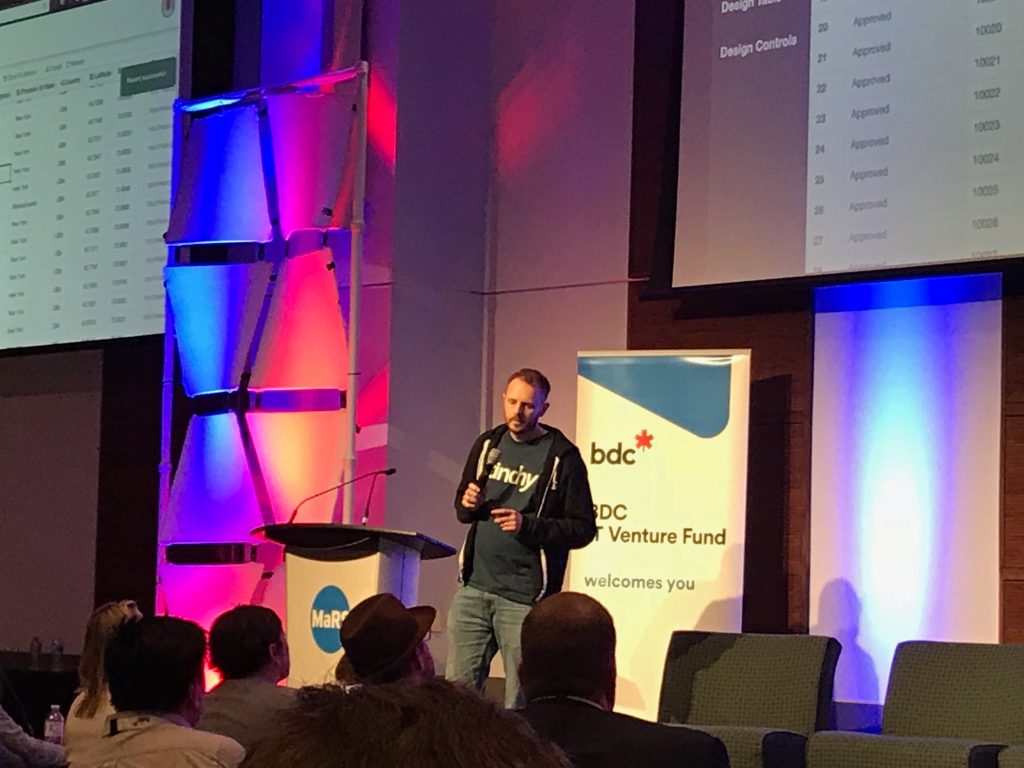As part of a regular series powered by Microsoft, BetaKit interviews prominent Canadian CTOs speaking earnestly on the biggest challenges they face in their role, as well as future technology predictions in their space.
Karanjot Jaswal is a first-time startup CTO, building technology for the same type of large companies that he used to work for. As CTO of Cinchy, Jaswal is tackling enterprise-level data, having built a platform that allows multiple applications to share data without complex integrations. The goal is to help companies save time getting to market.
“Today, $400 billion is spent globally on trying to reuse existing data assets within an organization,” Jaswal explained, citing a cost that he says could be eliminated with a product like Cinchy. “If you’ve fully adopted that vision where you have a network of data that stands alone from the applications, then your applications actually contribute to that. They extend that data network and they draw information from it.”
Moving at the speed of your customers (while building trust)
As an enterprise software-as-a-service (SaaS) company, Cinchy is building data technology solutions for customers that include large financial institutions. This means that Cinchy needs to align with the technology used by their clients. “We’re somewhat constrained at this time to the technologies that their own internal teams are able to support,” Jaswal said.
These large financial institutions can have certain data sensitivity requirements that may require Cinchy’s technology to be run on-premises. Cinchy is built to support both on-premise and private cloud implementations, based on their customers’ comfort levels and technical requirements.
“We try to always make it such that whatever we add in is applicable to multiple [customers], so it’s not that we’re building something custom for ourselves.”
“As we grow confidence with these enterprise customers and they see the value that we bring to the table, then they’ll be a lot more open to giving us a bit more control over some of their information,” Jaswal said, explaining the future he envisions for Cinchy. “There is a trend of that happening but it’s still early days.”
“We’re offering a solution that gives [our customers] value today without necessarily forcing them to move to a platform that they’re not entirely comfortable with yet.”
While Jaswal believes the data problems Cinchy is tackling are ones that every CTO should be concerned about, as a small startup he’s aware of the perception the company must put forward to its customers.
“With us dealing with larger clients it’s really important we provide them with the support they’re looking for,” Jaswal said.
Eating your own data dog food
With customer relationships predicated on building trust and solving specific problems, Jaswal noted that Cinchy uses its own product extensively. He explained that “dogfooding” your own product is helpful not only for testing and providing quality assurance, but also for developing the product roadmap and understanding customer problems better.

“We make sure that we are able to successfully deliver against the use cases that we’re needed for and we do so in a generalized way, thinking about how a client would use the platform,” Jaswal said. “We try to always make it such that whatever we add in is applicable to multiple [customers], so it’s not that we’re building something custom for ourselves.”
A CTO challenge: breadth vs. depth
It’s common for a development team to be made up of generalists, or full-stack, in the early days, but Jaswal noted the importance of identifying opportunities for creating depth within the team and understanding where developing specialties can be beneficial, especially as the team grows.
“There will be pods that will be accountable for specific modules,” Jaswal said. “The skill set is more focused on that particular component.”
Growing the team and ensuring he’s making the right hires at the right stage is important to Jaswal now, but he recognized that as teams grow, incrementality becomes important as well.
“I think the challenges at that point will shift, though there will still be aspects where talent is very important,” he said, recalling his time managing engineers at a financial institution where the impact of making a large number of employees even one percent more productive was massive.
As a startup CTO applying the lessons he learned in large organizations, Jaswal said he was also thankful for the opportunities for growth presented by working at Cinchy. “From a learning standpoint I don’t think anything beats it,” he said.
For more on Cinchy, read Microsoft Canada’s interview with Cinchy CEO Dan DeMers on the democratization of data.


